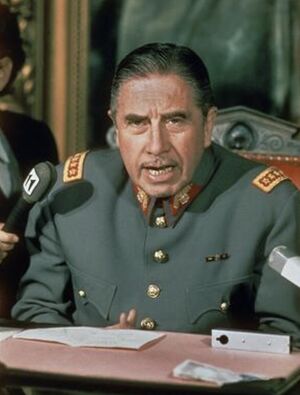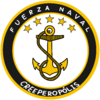Ethnic Violence in Creeperopolis
This article is incomplete because it is pending further input from participants, or it is a work-in-progress by one author. Please comment on this article's talk page to share your input, comments and questions. Note: To contribute to this article, you may need to seek help from the author(s) of this page. |
Ethnic violence in Creeperopolis has a long history among Creeperopolis's seven ethnic groups. Creeperopolis has seven primary ethnic groups: the Creeperans, Atlántidans, Castillianans, Senvarians, Senvekians, Salvadorans, and Deltinians. The Creeperans are the dominant group accounting for 56% of the population. Conflict between the ethnicities is often caused by ethnic and religious rivalries, political anc military corruption, and political and cultural repression.
Background
Ethnic tensions have existed in the region since the Deltinian-Creeperian War from 744AD-745AD.
Since then, each group has had rivalries against each other.
Ethnic Rivalries
Castillianan-Deltinian Rivalry
Castillianan-Senvar-Senvekian Rivalry
Creeperian-Atlántidan Rivalry
Creeperian-Castillianan Rivalry
The Creeperans and Castillianans have been allies since the beginning of the Creeperian Crusade in 1231. Both were Catholic groups that were oppressed by the Deltinians.
A small rivalry between the Creeperans and Castillianans truly began in the 1980's with the rise of the Militarist Front for National Liberation. The FMLN's goal was to gain independence for Castilliano after being annexed into Creeperopolis in 1949. The Castillianan Insurgency has raged on since then but fighting has been sporatic.
The insurgency ended on January 13, 2020, with the Treaty of Adolfosburg.
Creeperian-Deltinian Rivalry
The Creeperian-Deltinian rivalry is the longest lasting and the second most tensious ethnic rivalry in Creeperopolis.
The rivalry between the Creeperans and the Deltinians has existed since the Deltinian-Creeperian War from 744AD to 745AD. During the rule of the Deltinians over the Creeperans from 745AD to 1231, violent clashes often occured due to the Deltinian rule. The Deltinians at first forced Creeperian conversion to Deltinian Islam and to adopt the Spanish language. The Creeperans did adopt Spanish, evolving into Creeperian Spanish, but heavily resisted religious conversion. After years of massacres against the Creeperans, the Deltinians relented and allowed the Creeperans to freely practice Creeperian Catholicism, however churches would be heavily taxed while mosques were exempt from tax.
When the Creeperans revolted against Deltinian rule in 1231 in response to the One-Religion Decree, the Deltinians returned to killing Creeperian Catholic for refusing to convert. The Creeperans, in response, killed any Deltinian Muslims for not converting and for the centuries of repression. Each side committed mass religious ethnocide to "cleanse the land of the inferior religion" and ocassionally "the lesser race."
The climax of Deltinian-Creeperian aggression during the Creeperian Crusade was the Massacre of Almadinat Almuqadasa where the Creeperian Crusaders slaughtered 200,000 Deltinian Muslims. The massacre and the fall of the Deltinian capital, Almadinat Almuqadasa, marked the end of the Caliphate and marked the start of the short reigns of the three successor emirates: Abdan, Helam, and Jakiz. Each was defested by 1350 and the fall of each capital resulted in a massacre of the Deltinian Muslims.
After the Creeperian Crusade ended in 1365, the Deltinians were exiled to the southern departments of Abdan, Helam, and Jakiz. From 1365 to 1565, the Deltinians ocassionally revolted against the Creeperans in attempts to spark a Deltinian Jihad as retaliation for the Creepeperian Crusade. The Deltinian War, Ten Years' War, and Twenty Years' War all ended in massacres of the Deltinians. By 1565, the Deltinian population had fallen from 100 million in 1231 to 1 million.
During the First Parliamentary Era, the Deltinians enjoyed ease and respresentation in parliament, often voting for the Liberal Party.
From 1565-1933, the Deltinians were treated peacefully and the minority prospered. However, during the Creeperian Civil War, 2 million Deltinians died. The most famous massacre was the 1944 Denshire Massacre where Sombra Negra killed over 25,000 Deltinians. The Deltinians were exiled in 1949 south to the department of Deltino.
During the Creeperian Conflicts, the Deltinians were mistreated by all beligerents: the Creeperian Armed Forces, Militarist Nationalist Front, Senvarian Liberation Front, Militarist Front for National Liberation, and Mara Salvatrucha. After 70 years of constant oppression by four different ethnic groups, the Deltinians snapped. A Deltinian religious figure, Kanaan el-Bashir, declared jihad on all six opposing ethnic groups in Creeperopolis beginning the Deltinian Insurgency. He declared the Emirate of Deltino and has ambissions to reestablish the caliphate. In response, the Deltinian Liberation Army and the Deltinian Peoples' Defense Militia joined the jihad. El-Bashir claimed that all 100,000 Deltinians were willing to fight for the liberation of the oppressed Deltinians.
Following a cease fire amongst the FAC, SLF, FRENAMI, MS, and FMLN, the DLA and DPDM made claims and allegations that all five beligerents are commiting war crimes and genocide against the Deltinians in what is called the Deltinian Genocide.[citation needed]
Creeperian-Senvar-Senvekian Rivalry

Tensions between the Creeperans and the Senvar-Senvekians has been present since the two groups came into contact following the Creeperian Crusade. The Creeperans conquered and annexed the kingdoms of Senvar and Senvek in 1456 during the Three Years' War, but a Kingdom of Senvar-Senvek emerged in 1504 after the Twenty Years' War.
The two groups have existed in relative peace from 1504-1839. However, Creeperian Emperor Adolfo III annexed Senvar-Senvek in 1839. The annexation sparked the first of three Senvar-Senvekian insurgencies. From 1839-1858 the First Senvarian Insurgency raged followed them by the Second Senvarian Insurgency from 1878-1888. The Third Senvarian Insurgency began in 1934.
The insurgency ended on January 15, 2020, and ended with the Treaty of Puerto Atlántida.
Deltinian-Atlántidan Rivalry
Deltinian-Senvar-Senvekian Rivalry
Deltinian-Salvadoran Rivalry
Salvadoran-Creeperian Rivalry
Senvarian-Senvekian Rivalry
Religious Rivalries
Catholic-Islamic Rivalry
Islamic-Protestant Rivalry
Protestant-Catholic Rivalry
Genocides and Ethnic Cleanisings
Atlántidan Genocide
Creeperian Genocide
The Creeperian Genocide was less an ethnically driven but more politically driven. The National Council for Peace and Order began indescriminate killings of Creeperian Catholics, Salvadorans, and Romerists. It killed 10 million Creeperans.







